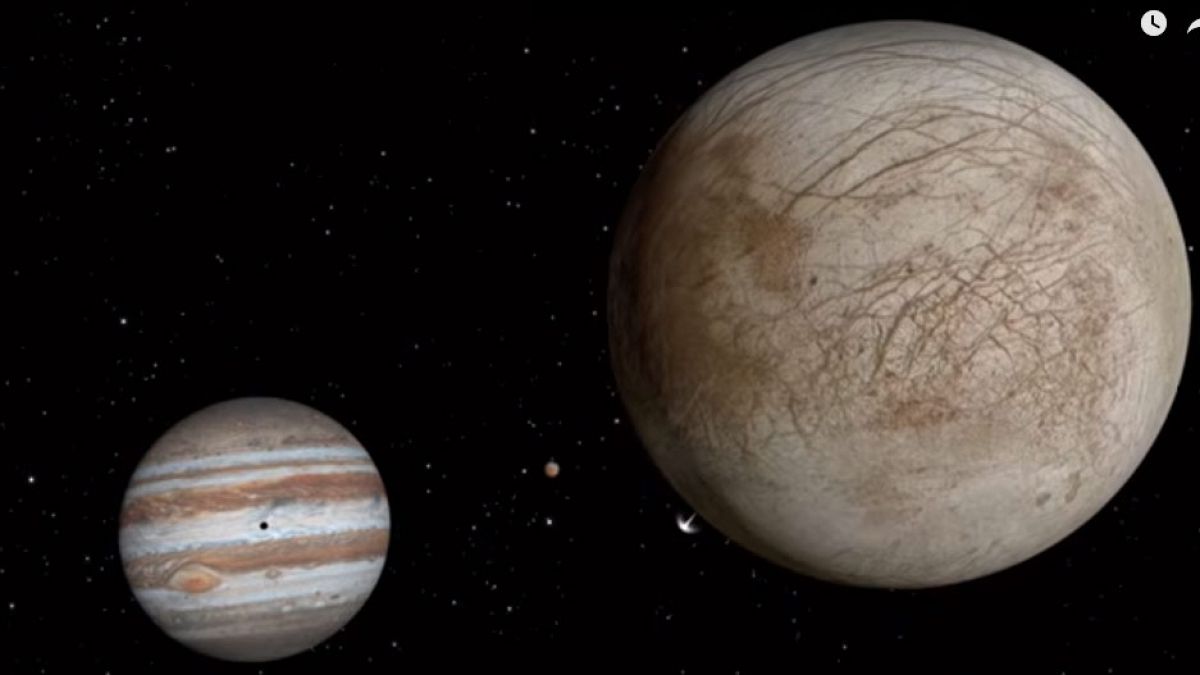Nasa believes it has more proof that Europa, one of Jupiter’s moon, is expelling large plumes of water. And where there is water, life can find a way, scientists believe.
Is it true that water has recently been discovered on Jupiter’s moon, Europa?
Yes, we think so. NASA/ESA Hubble space telescope took direct ultraviolet images and saw what appear to be plumes of water vapour.
Plumes of water vapour? What do you mean?
In 2012 scientists used the Hubble Telescope to observe a faint aurora from the interaction of Europa and Jupiter’s magnetic field. They detected what appeared to be water molecule emissions, concluding that the most plausible explanation for the aurora was the existence of plumes of water vapour erupting from the surface. Another team pictured Europa as it passed in front of Jupiter. They had similiar results. The plumes were pictured erupting up to about about 200km above the surface before falling back down.
.
NASA_Hubble</a> has spotted possible water plumes on <a href="https://twitter.com/hashtag/Jupiter?src=hash">#Jupiter</a>'s moon <a href="https://twitter.com/hashtag/Europa?src=hash">#Europa</a>. Live teleconference ongoing now: <a href="https://t.co/be3HhLXtbx">https://t.co/be3HhLXtbx</a> <a href="https://t.co/XfwsopNlW8">pic.twitter.com/XfwsopNlW8</a></p>— NASA Solar System (NASASolarSystem) September 26, 2016
Where does this water come from?
Scientists have long believed that Europa held a global ocean of water beneath its surface of ice. But it is protected by a layer of extremely cold and hard ice of unknown thickness.
Is this a first, to find water on a planet’s moon?
These sightings are evidence and not proof. But if they are confirmed, that would make it the second moon in our solar system to have water vapour plumes. Saturn’s moon Enceladus was found to have ejected jets of water vapour and dust in 2005 by Nasa’s Cassini orbiter.
Where else is water likely to be found in our solar system?
All over, is the answer. In addition to Europa, scientists believe two of Jupiter’s other moon’s Ganymede and Callisto have water beneath their surface. They believe Enceladus and Titan, two moons of Saturn, are part of what they call “ocean worlds of our solar system”. Even Neptune’s moon, Triton, is thought to have water, according to Dr Kevin Hand, deputy chief scientist for Solar System Exploration at NASA.
And NASA has said that it believes there is water on our moon.
Coming back to Europa, does this mean that it’s possible there is life there?
“Europa’s ocean is considered to be one of the most promising places that could potentially harbor life in the solar system,” says Geoff Yoder, acting associate administrator for NASA’s Science Mission Directorate.
Yes, possibly. It has liquid water, access to the building blocks of life, and energy, says Dr Hand. If we have learned anything of life on this earth, it is that where you find liquid water, you find life. From hydrothermal vents to the coldest regions in the Antartica – where there is liquid water, life somehow finds a way.
Are we talking about aliens, Close Encounters of the Third Kind?
This is unlikely to be the case but we don’t know. The most likely scenario is microbiological entities.
So what next?
Future observations by Hubble and the James Webb Space Telescope should shed more light on this issue. NASA’s flyby of Jupiter and the ESA’s Juice Mission should also give us more info.
Juice Mission? What’s that?
Planned for launch in 2022 and arrival at Jupiter in 2030, The Juice Mission plans to spend at least three years making detailed observations of the giant gaseous planet Jupiter and three of its largest moons, Ganymede, Callisto and Europa
_*Sources: ESA. Nasa.gov; Exploring Europa – Ocean Worlds of the Outer Solar System by Dr Kevin Hand, YouTube.*
